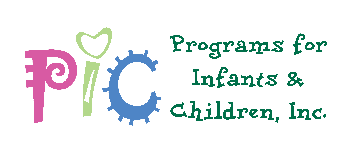
FOR PROVIDERS: SUPPORT IS AVAILABLE
Parents and providers play a crucial role in helping children reach their full potential. PIC provides a range of services, including assessments, therapies, and educational programs, to support children with delays in their development. Early intervention can be life-changing for families, helping them navigate the often overwhelming process of caring for a child with developmental delays.
REFERRALS AND SUPPORT
By referring children to receive early intervention services, parents can receive valuable information and resources to help their child reach their full potential. Early intervention providers work closely with families to develop individualized plans that are tailored to the child's unique needs and abilities.
To make a referral download the below form or call (907) 561-8060.
Once completed, please fax form to PIC at (907) 563-3172.
SUPPORT MATERIALS
Early Intervention services are a valuable resource for parents and providers.
PIC has materials for you to share with your families such as:
Brochures
Posters for waiting rooms or public areas
In-services for staff on Early Intervention services and practices
Free Online ASQ-3 and ASQ-SE developmental screening tools
To request support materials, please fill the below form, or call
(907) 561-8060. We will respond to your request within 2-3 days.

FAQS FOR PROVIDERS
WHAT COMMUNITIES DOES PIC SERVE?
Programs for Infants & Children (PIC) serves children and families in Anchorage, Whittier, and Girdwood. PIC also provides service to children and families in Iliamna, Newhalen, Kokhanok, Igiugig, Nondalton, Pedro Bay, and Port Alsworth.
WHAT IS THE EARLY INTERVENTION/INFANT LEARNING PROGRAM?
The State of Alaska’s Early Intervention/Infant Learning Program (EI/ILP) serves as a single point of entry for infants and toddlers whose families or others have concerns about their child’s development. Under the Individuals with Disabilities Act (IDEA), EI/ILP is responsible for implementing services to young children, birth to three years, who experience developmental delays and disabilities.
WHO IS ELIGIBLE FOR PIC’S SERVICES?
Children are automatically eligible for early intervention services when they have a condition known to result in developmental delay (i.e. Down’s Syndrome, cerebral palsy, autism). They are also eligible if they demonstrate a 50% delay in any one of five developmental areas (cognitive, physical communication, social/emotional, and adaptive). Under special circumstances, children may also be determined eligible based on additional information indicating that there is a potential delay in areas that are difficult to assess with standard measures.
WHAT SERVICES CAN PIC PROVIDE?
Early intervention services like those provided at PIC are designed to meet the individualized needs of the child and family. PIC provides a variety of services such as early childhood education, social work, occupational, physical and speech/language therapy, as well as special instruction, vision, and audiology services. PIC services are provided in partnership with parents and caregivers to provide training and support in promoting their child’s development. Family service coordination is provided to help families navigate the systems and providers involved in their child’s care. PIC uses a team-based early intervention model referred to as the “Primary Coaching Model”.
WHO CAN REFER TO PIC?
PIC accepts referrals from anyone who has concerns about a child’s development including parents, family members, friends, physicians, hospitals, child protection, child care staff, and other community partners such as WIC, Early Head Start, and Parents as Teachers programs. The key to effective early intervention is the immediate referral of children with suspected delays.
WHAT HAPPENS WHEN A CHILD IS REFERRED?
PIC will complete an assessment to determine a child’s eligibility for services. A full evaluation is completed by a multi-disciplinary team to assess all areas of development. (i.e. motor, cognitive, communication, social/emotional, and self help areas such as eating, dressing, and toileting). An Individualized Family Services Plan (IFSP) will be developed with the family if the child is eligible for services. This plan will describe the services needed by the child and family and how they will be provided. The IFSP includes the goals most important to the family.
HOW SOON WILL FAMILIES BE CONTACTED?
When a referral is made to PIC, families are typically contacted within three to four business days to begin the intake process. In most cases, children who are eligible for services are evaluated and an Individualized
Family Services Plan is developed within 45 day of the date of referral. All eligible children and their families are enrolled within 45 days of referral, and can expect to receive services immediately. There is no wait list for Part C eligible children at PIC.
WHO PAYS FOR THE SERVICES?
All services provided by PIC have NO COST to families. PIC asks for parent’s consent to bill Medicaid and Insurance for some services but parents are not expected to pay co-pays or co-insurance for balances.
WHERE ARE THE SERVICES PROVIDED?
Early intervention services are performed in “natural environments” or places that typically developing infants and toddlers spend their day. Most services happen in the family’s home. PIC also works in childcare centers and other locations in the community. The location of services is determined by the parents.
HOW ARE SERVICES PROVIDED?
PIC’s services are provided to families and their children through a primary coaching approach which values strong relationships
and a team supported process. Every child and family:
Has a service coordinator who is their primary provider. The primary provider is selected based on the needs of the child and family. The primary provider has a team of individuals from all disciplines who support the provider, family, and child.
Has an individualized family service plan that is regularly reviewed so that services meet the needs of the child and family’s needs change.
Has a team of providers ensure that parents receive consistent, unduplicated, timely, evidence-based, individualized, and comprehensive information, training, and support. This ensures that every family has access to a full team of professionals that include early childhood educators and special educators, occupational therapists, physical therapists, speech language pathologists, social workers, and behavioral health specialists.




